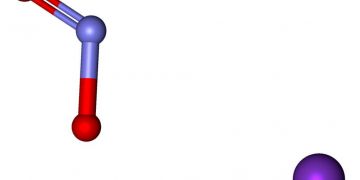This naturally occurring compound is important as a blood electrolyte, along with sodium and chloride. Potassium is a key mechanism removing Sodium (which has the chemical symbol "Na") from cells in the body via a process known as the Na+/K+ ATPase pump. The body needs potassium in order to work this pump and remove sodium. Sodium is dangerous if it builds up in cells and this is why it is often advised to reduce sodium consumption and increase potassium, especially if one has high blood pressure and/or cardiac dysfunctions. Magnesium is also important in helping to maintain potassium in the cells.
Potassium is important for the following bodily functions:
A normal supply of potassium is important for preventing certain muscle contractions. A person who has a depletion of potassium may find that they have symptoms of muscle contractions and muscle weakness and also experience Pins & Needles.
A shortage of potassium in the body's fluids can result in a fatal condition called hypokalemia. This disorder can result after the person has had a significant period of vomiting or diarrhea, for example.
Being low in potassium can affect human nerve transmission as the Na+/K+ transfers across cell walls and creates electric potential that powers the conduction of nerve impulses. When potassium leaves the cell, it changes the membrane potential and allows the nerve impulse to progress. This electrical potential gradient, created by the "sodium/potassium pump" (Na+/K+ pump) helps generate muscle contractions and regulates the heartbeat. When the body is low in potassium this current is harder to maintain, as potassium is the primary cation (positively charged ion) within the cells.
Other human medical disorders can result from a depletion of potassium including ECG abnormalities, a decreased reflex response, and paralytic ileus.
More severe deficiencies of potassium can result in respiratory paralysis, alkalosis, and cardiac arrhythmia.
Electrolyte Imbalance
A deficiency of potassium can result in a condition called an electrolyte imbalance in the body. This condition is one of the more prevalent problems that can result from a potassium deficiency. As discussed above, potassium is one of the main positively charged ions in the body. 98% of the potassium concentration found within an average person is contained within cells. It is vital for proper cell function throughout the body.
Dietary Intakes of Potassium
A balanced diet can usually provide a sufficient amount of daily potassium. Many fruits and vegetables are high in potassium, low in sodium, which is the balance needed by the body to help keep sodium levels down within cells and therefore help prevent hypertension. Fresh, frozen or dried food is best, as most of the potassium is lost when processing or canning foods.
The following foods have rich sources of potassium:
Sweet potatoes and white potatoes.
Dried apricots, raisins and bananas are known for their potassium rich fibers.
Apples, oranges and other citrus fruits
Chocolate and dried milk
Fish particularly cod, salmon, sardines and flounder.
Meats often have more potassium than sodium, however be aware of added salt that will increase Sodium concentration.
Most wholegrain, wheatgerm, seeds and nuts especially Almonds and Pistachios.
Herbs that contain significant Potassium are: red clover, sage, catmint, hops, horsetail, nettle, plantain and skullcaps.
Potassium absorption inhibitors
Caffeine and tobacco are both known to reduce potassium absorption. Smokers, coffee drinkers and those on crash diets seem to be the most susceptible to low potassium levels.
Dietary Supplements
Potassium supplements can be used to ensure a daily intake of potassium. Heart patients often use a secondary intake of potassium in order to prevent the risk of hypertension and the possibility of stroke. Medical supplements of potassium are used along with loop diuretics and thiazides to prevent heart related diseases and symptoms.
Patients who wish to reduce their intake of sodium can use potassium chloride as a substitute for table salt. This type of patient uses potassium chloride instead of table salt in order to control symptoms of hypertension.
Potassium supplements are often used as a dietary aid. A patient can have a history of heart disorder symptoms or a history of central nervous system damage. Both heart patients and stroke patients are monitored for their dietary intake and for their use of regular table salt. Sodium substitutes are frequently recommended for these two types of patients, and potassium chloride is frequently chosen as a dietary substitute. Patients who have a severe heart disorder that significantly interacts with table salt are frequently required to use a table salt substitution.
Summary
Potassium is vital for normal bodily functions to be maintained. A balanced dietary intake can replenish a human body with a required amount of potassium. Where there is low potassium, a secondary medical problem may be creating this depletion. A potassium health supplement is frequently used as a natural treatment. Potassium supplements are used by heart patients and stroke patients. Potassium is sold as a dietary supplement rather than as a prescription drug or medicine.





